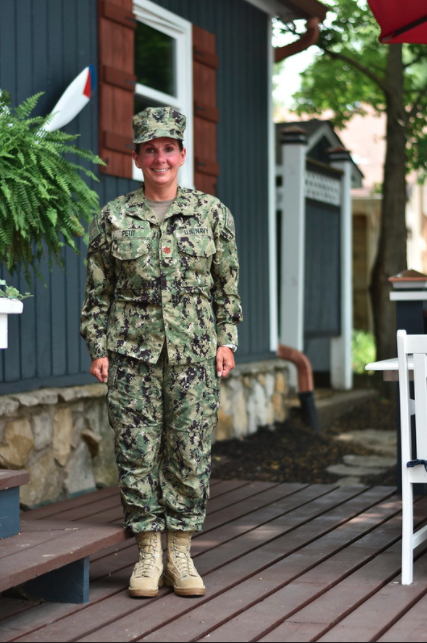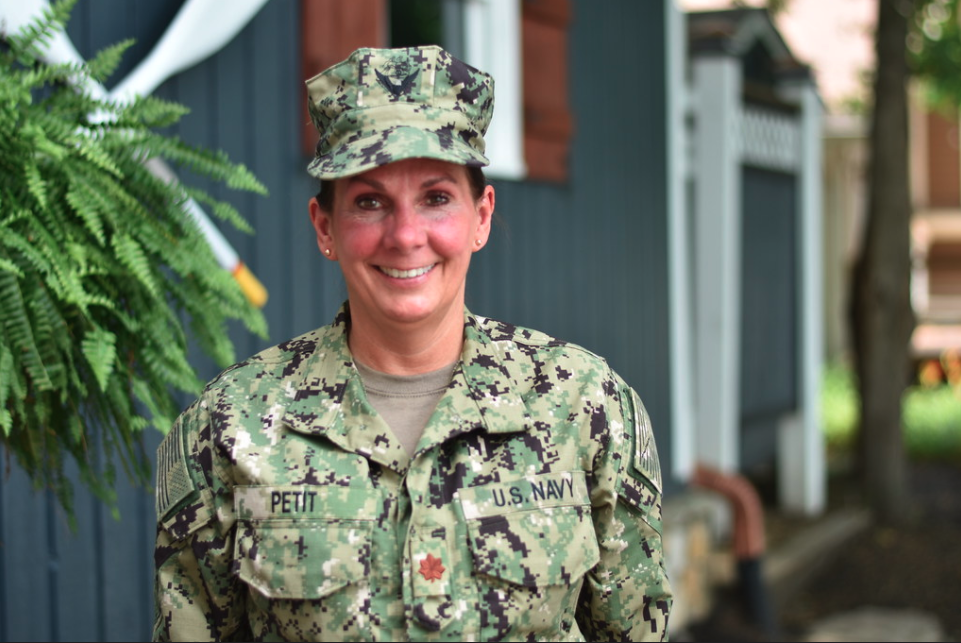Local Nurse Recalls Experiences Volunteering in New York City During COVID-19 Outbreak
Photographer / BriAnna Seefeldt
 When Robin Petit was four years old, she told her dad that when she grew up, she was going to become a nurse because she wanted to bring babies into the world instead of watching people go out of the world.
When Robin Petit was four years old, she told her dad that when she grew up, she was going to become a nurse because she wanted to bring babies into the world instead of watching people go out of the world.
“It turns out, I’ve now done both,” says Petit, who pursued her dream and has been a nurse for 27 years.
For the longest time, she had another dream – to join the Navy. When she was 41, she spoke to a recruiter who turned her away because he said she was too old.
“I told him, ‘I’m a nurse. We work until we’re dead,’” Petit says.
Crushed by the rejection, she walked away but the dream still simmered. Three years later she received an email stating that the Army accepts nurses until age 46, so she joined the Army Reserve at age 44. Five years later, in 2013, Petit met a Navy recruiter who spotted her in her scrubs while she was getting a new identification badge, and he inquired about what she did. When she told him she was a nurse working in an operating room, he invited her to join the Navy.
“It was like it was meant to be,” says Petit, who immediately transferred.
Now, she works as both an OR nurse for the Navy and a nurse practitioner on the civilian side. In fact, Petit had just begun working at Community Health Network and Carmel Specialty Surgery Center when the Navy called her in early April to ask if she would be willing to volunteer to go to New York City and treat COVID-19 patients. Without hesitation, she agreed, even though she had no idea what she would be doing, exactly where she would be going or how long she’d be there. She began packing and within 48 hours, she and 200 fellow Navy volunteers were in New York City. Within 96 hours they were in area hospitals, spread out across seven of the city’s 11 public hospitals.
Petit, who was stationed at the North Central Bronx Hospital, worked 12-hour shifts caring for critically ill COVID-19 patients. She and her colleagues started a prone team, for which they turned patients onto their abdomens to allow their lungs to expand, thereby improving breathing. Though she was continually caring for coronavirus patients, Petit never feared getting infected.
“We were more concerned about going in and providing the best care we possibly could for these patients,” Petit says, her voice cracking with emotion as she recalls the experience. “I’m very proud of every single person I worked with. It was an amazing group of people.”
Though the days were exhausting, Petit found comfort in daily victories. Each time a patient was extubated, the hospital played a certain Katy Perry song, and each time someone was discharged from the hospital, the staff played Frank Sinatra’s “New York, New York”.
“Whenever we heard those songs, we celebrated,” Petit says.
There were, of course, sad stories too. One of Petit’s vivid memories is sitting with one of her patients as his health declined.
“I prayed with him and held his hand as I watched his heart rate go down, then up, then down again,” says Petit, who was with the patient when he passed.
Due to its highly contagious nature, COVID-19 patients could not receive visitors, and those who were intubated couldn’t talk. Nurses facilitated video chats with families on iPads, so that loved ones could feel connected even though they could not share the same physical space.
“That was very emotional,” Petit says. “We also had a priest that was a reservist who gave last rites to a patient whose family was frantic. The fact that people couldn’t come in and say goodbye to their loved ones was so heartbreaking.”
Originally Petit thought she might be in a mobile unit, traveling to various hot spots like New York City, Louisiana or California. Ultimately, she stayed put in New York City until early June. Once cases and hospitalizations began decreasing, and hospital operations were under control, she was sent home. Though Petit, a Noblesville resident since 2008, was eager to return home to her husband Van and their grandchildren, she was happy to have served.
“Honestly, it was a true honor and privilege taking care of these people,” Petit says. “I’m also grateful to have had the opportunity to serve with so many amazing people.”
Should hot spots pop up again, there is always a chance that she will be asked to volunteer again.
“Once you’re mobilized, you get a certain amount of time where they can’t deploy or mobilize you again unless you waive that time,” Petit says. “Given the circumstances, I think a lot of people would waive that time and volunteer again.”
The Thin Line Spotlight is sponsored by Kahlo Chrysler Dodge Jeep Ram 






